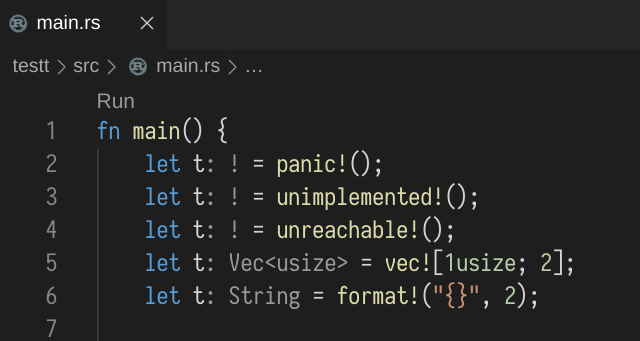todo!() "Indicates unfinished code" (https://doc.rust-lang.org/std/macro.todo.html)
Rust documentation provides further clarification:
> The difference between unimplemented! and todo! is that while todo!
> conveys an intent of implementing the functionality later and the
> message is "not yet implemented", unimplemented! makes no such claims.
todo!() seems more appropriate for assists that insert missing impls.
3746: Add create_function assist r=flodiebold a=TimoFreiberg
The function part of #3639, creating methods will come later
- [X] Function arguments
- [X] Function call arguments
- [x] Method call arguments
- [x] Literal arguments
- [x] Variable reference arguments
- [X] Migrate to `ast::make` API
Done, but there are some ugly spots.
Issues to handle in another PR:
- function reference arguments: Their type isn't printed properly right now.
The "insert explicit type" assist has the same issue and this is probably a relatively rare usecase.
- generating proper names for all kinds of argument expressions (if, loop, ...?)
Without this, it's totally possible for the assist to generate invalid argument names.
I think the assist it's already helpful enough to be shipped as it is, at least for me the main usecase involves passing in named references.
Besides, the Rust tooling ecosystem is immature enough that some janky behaviour in a new assist probably won't scare anyone off.
- select the generated placeholder body so it's a bit easier to overwrite it
- create method (`self.foo<|>(..)` or `some_foo.foo<|>(..)`) instead of create_function.
The main difference would be finding (or creating) the impl block and inserting the `self` argument correctly
- more specific default arg names for literals.
So far, every generated argument whose name can't be taken from the call site is called `arg` (with a number suffix if necessary).
- creating functions in another module of the same crate.
E.g. when typing `some_mod::foo<|>(...)` when in `lib.rs`, I'd want to have `foo` generated in `some_mod.rs` and jump there.
Issues: the mod could exist in `some_mod.rs`, in `lib.rs` as `mod some_mod`, or inside another mod but be imported via `use other_mod::some_mod`.
- refer to arguments of the generated function with a qualified path if the types aren't imported yet
(alternative: run autoimport. i think starting with a qualified path is cleaner and there's already an assist to replace a qualified path with an import and an unqualified path)
- add type arguments of the arguments to the generated function
- Autocomplete functions with information from unresolved calls (see https://github.com/rust-analyzer/rust-analyzer/pull/3746#issuecomment-605281323)
Issues: see https://github.com/rust-analyzer/rust-analyzer/pull/3746#issuecomment-605282542. The unresolved call could be anywhere. But just offering this autocompletion for unresolved calls in the same module would already be cool.
Co-authored-by: Timo Freiberg <timo.freiberg@gmail.com>
3814: Add impl From for enum variant assist r=flodiebold a=mattyhall
Basically adds a From impl for tuple enum variants with one field. It was recommended to me on the zulip to maybe try using the trait solver, but I had trouble with that as, although it could resolve the trait impl, it couldn't resolve the variable unambiguously in real use. I'm also unsure of how it would work if there were already multiple From impls to resolve - I can't see a way we could get more than one solution to my query.
Fixes#3766
Co-authored-by: Matthew Hall <matthew@quickbeam.me.uk>
Basically adds a From impl for tuple enum variants with one field. Added
to cover the fairly common case of implementing your own Error that can
be created from another one, although other use cases exist.
3700: fill match arms with empty block rather than unit tuple r=matklad a=JoshMcguigan
As requested by @Veetaha in #3689 and #3687, this modifies the fill match arms assist to create match arms as an empty block `{}` rather than a unit tuple `()`.
In one test I left one of the pre-existing match arms as a unit tuple, and added a body to another match arm, to demonstrate that the contents of existing match arms persist.
Co-authored-by: Josh Mcguigan <joshmcg88@gmail.com>
Addresses #3039
This essentially adds missing match arms. The algorithm for this
can get complicated rather quickly so bail in certain conditions
and rely on a PlaceholderPat.
The algorighm works as such:
- Iterate through the Enum Def Variants
- Attempt to see if the variant already exists as a match arm
- If yes, skip the enum variant. If no, include it.
- If it becomes complicated, rather than exhaustively deal with every
branch, mark it as a "partial match" and simply include the
placeholder.
Conditions for "complication":
- The match arm contains a match guard
- Any kind of nested destrucuring
Order the resulting merged match branches as such:
1. Provided match arms
2. Missing enum variant branch arms
3. End with Placeholder if required
- Add extra tests
This introduces the new type -- Semantics.
Semantics maps SyntaxNodes to various semantic info, such as type,
name resolution or macro expansions.
To do so, Semantics maintains a HashMap which maps every node it saw
to the file from which the node originated. This is enough to get all
the necessary hir bits just from syntax.
3108: Magic Completion for `impl Trait for` Associated Items r=matklad a=kdelorey
# Summary
This PR adds a set of magic completions to auto complete associated trait items (functions/consts/types).

## Notes
Since the assist and completion share the same logic when figuring out the associated items that are missing, a shared utility was created in the `ra_assists::utils` module.
Resolves#1046
As this is my first PR to the rust-analyzer project, I'm new to the codebase, feedback welcomed!
Co-authored-by: Kevin DeLorey <2295721+kdelorey@users.noreply.github.com>
3050: Refactor type parameters, implement argument position impl trait r=matklad a=flodiebold
I wanted to implement APIT by lowering to type parameters because we need to do that anyway for correctness and don't need Chalk support for it; this grew into some more wide-ranging refactoring of how type parameters are handled 😅
- use Ty::Bound instead of Ty::Param to represent polymorphism, and explicitly
count binders. This gets us closer to Chalk's way of doing things, and means
that we now only use Param as a placeholder for an unknown type, e.g. within
a generic function. I.e. we're never using Param in a situation where we want
to substitute it, and the method to do that is gone; `subst` now always works
on bound variables. (This changes how the types of generic functions print;
previously, you'd get something like `fn identity<i32>(T) -> T`, but now we
display the substituted signature `fn identity<i32>(i32) -> i32`, which I think
makes more sense.)
- once we do this, it's more natural to represent `Param` by a globally unique
ID; the use of indices was mostly to make substituting easier. This also
means we fix the bug where `Param` loses its name when going through Chalk.
- I would actually like to rename `Param` to `Placeholder` to better reflect its use and
get closer to Chalk, but I'll leave that to a follow-up.
- introduce a context for type lowering, to allow lowering `impl Trait` to
different things depending on where we are. And since we have that, we can
also lower type parameters directly to variables instead of placeholders.
Also, we'll be able to use this later to collect diagnostics.
- implement argument position impl trait by lowering it to type parameters.
I've realized that this is necessary to correctly implement it; e.g. consider
`fn foo(impl Display) -> impl Something`. It's observable that the return
type of e.g. `foo(1u32)` unifies with itself, but doesn't unify with e.g.
`foo(1i32)`; so the return type needs to be parameterized by the argument
type.
This fixes a few bugs as well:
- type parameters 'losing' their name when they go through Chalk, as mentioned
above (i.e. getting `[missing name]` somewhere)
- impl trait not being considered as implementing the super traits (very
noticeable for the `db` in RA)
- the fact that argument impl trait was only turned into variables when the
function got called caused type mismatches when the function was used as a
value (fixes a few type mismatches in RA)
The one thing I'm not so happy with here is how we're lowering `impl Trait` types to variables; since `TypeRef`s don't have an identity currently, we just count how many of them we have seen while going through the function signature. That's quite fragile though, since we have to do it while desugaring generics and while lowering the type signature, and in the exact same order in both cases. We could consider either giving only `TypeRef::ImplTrait` a local id, or maybe just giving all `TypeRef`s an identity after all (we talked about this before)...
Follow-up tasks:
- handle return position impl trait; we basically need to create a variable and some trait obligations for that variable
- rename `Param` to `Placeholder`
Co-authored-by: Florian Diebold <florian.diebold@freiheit.com>
Co-authored-by: Florian Diebold <flodiebold@gmail.com>
This intention is pretty slow for `impl Interator`, because it has a
ton of default methods which need to be substituted.
The proper fix here is to not compute the actual edit until the user
triggers the action, but that's awkward to do in the LSP right now, so
let's just put a profiling code for now.
2018: assists: add assist for custom implementation for derived trait r=matklad a=paulolieuthier
Please, tell me if something could be more idiomatic or efficient.
Fixes#1256.
Co-authored-by: Paulo Lieuthier <paulolieuthier@gmail.com>
2343: implement assist invert_if r=matklad a=bravomikekilo
fix [issue 2219 invert if condition](https://github.com/rust-analyzer/rust-analyzer/issues/2219)
I put the assist cursor range to `if` of the if expression, because both condition and body will be replaced. Is there any way to replace them without cover the cursor position?
@matklad
Co-authored-by: bravomikekilo <bmk1221@126.com>
2165: ra_assists: Add add_new assist r=matklad a=rep-nop
Adds a new assist to autogenerate a new fn based on the selected struct, excluding tuple structs and unions. The fn will inherit the same visibility as the struct and the assist will attempt to reuse any existing impl blocks that exist at the same level of struct.
Not marking this as closing #1644 since there's a part 2 of adding autocompletion for when someone starts typing `[pub ]fn new(...`
Co-authored-by: Wesley Norris <repnop@outlook.com>
Adds a new assist to autogenerate a new fn based on the selected struct,
excluding tuple structs and unions. The fn will inherit the same
visibility as the struct and the assist will attempt to reuse any
existing impl blocks that exist at the same level of struct.
2099: Fix panic on raw string assist r=matklad a=aee11
Strings that do not contain two quotation marks would cause a slice indexing panic because `find_usual_string_range` would return a range that only contained a single quotation mark.
Panic example:
```
fn main() {
let s = "<|>
}
```
I noticed a lot of panics from the `make_raw_string` assist while working on another issue today.
Co-authored-by: Alexander Elís Ebenesersson <alex2789@gmail.com>
Strings that do not contain two quotation marks
would cause a slice indexing panic because code
was assuming `find_usual_string_range` would return
a string with two quotes, but it would incorrectly
also return text ranges containing only a single quote.
Fixes#1807
This assist can transform expressions of the form `!x || !y` into
`!(x && y)`. This also works with `&&`.
This assist will only trigger if the cursor is on the central logical
operator.
The main limitation of this current implementation is that both operands
need to be an explicit negation, either of the form `!x`, or `x != y`.
More operands could be accepted, but this would complicate the implementation
quite a bit.
1815: Support correct `$crate` expansion in macros r=uHOOCCOOHu a=uHOOCCOOHu
This PR makes normal use cases of `$crate` from macros work as expected.
It makes more macros from `std` work. Type inference works well with `panic`, `unimplemented`, `format`, and maybe more.
Sadly that `vec![1, 2, 3]` still not works, but it is not longer an issue about macro.
Screenshot:

Co-authored-by: uHOOCCOOHu <hooccooh1896@gmail.com>